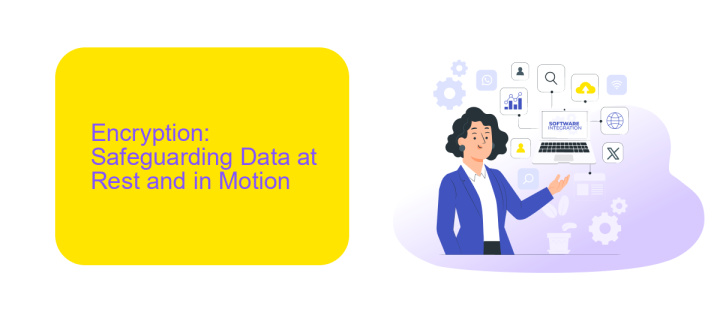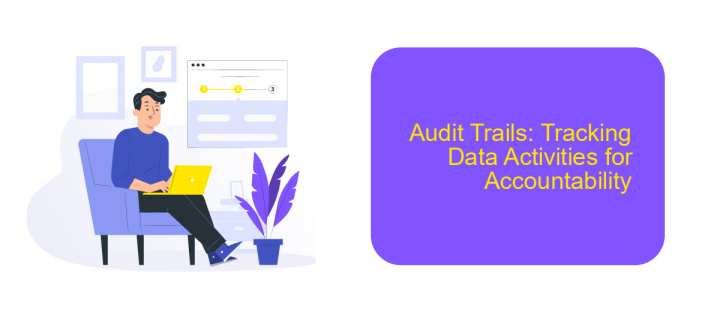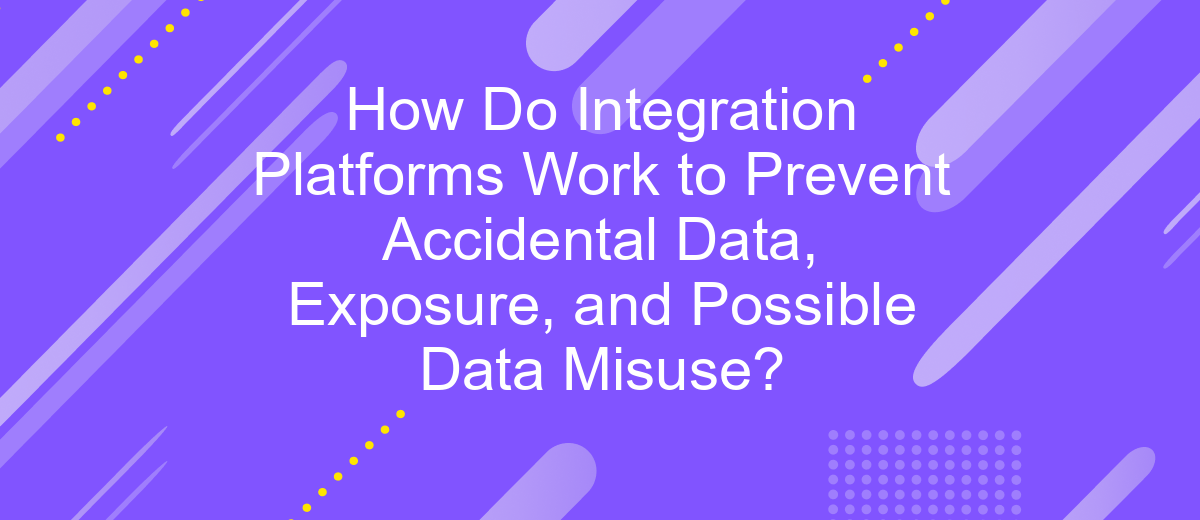How Do Integration Platforms Work to Prevent Accidental Data, Exposure, and Possible Data Misuse?
In today's digital landscape, integration platforms play a crucial role in safeguarding sensitive information. These systems ensure seamless data flow between various applications while implementing robust security measures to prevent accidental data exposure and misuse. By leveraging advanced encryption, access controls, and real-time monitoring, integration platforms provide a secure environment for data exchange, thereby protecting organizations from potential breaches and compliance risks.
Integration Platforms and the Layers of Security
Integration platforms play a crucial role in ensuring data security by implementing multiple layers of protection. These platforms, such as ApiX-Drive, offer robust solutions to prevent accidental data exposure and misuse.
- Data Encryption: Ensures that sensitive information is encrypted both in transit and at rest.
- Access Controls: Implements strict user authentication and authorization protocols to restrict access to data.
- Monitoring and Logging: Continuous monitoring and logging of data activities help in identifying and mitigating potential security threats.
- Data Masking: Protects sensitive data by obscuring it, making it accessible only to authorized users.
- Compliance: Adheres to industry standards and regulations, such as GDPR and HIPAA, ensuring legal compliance.
With these layers of security, integration platforms like ApiX-Drive help organizations safeguard their data. These measures not only protect against unauthorized access but also ensure that data is handled in compliance with regulatory requirements, thereby preventing potential misuse and accidental exposure.
Encryption: Safeguarding Data at Rest and in Motion

Encryption plays a crucial role in safeguarding data both at rest and in motion, ensuring that sensitive information remains protected from unauthorized access. When data is at rest, such as when it is stored on servers or databases, encryption transforms it into an unreadable format, accessible only to those with the decryption key. This layer of security is vital for preventing accidental data exposure and potential misuse by malicious actors.
For data in motion, such as during transmission between systems or applications, encryption ensures that the data remains secure while being transferred. Integration platforms like ApiX-Drive implement robust encryption protocols to protect data as it moves between various endpoints. By utilizing advanced encryption standards, ApiX-Drive ensures that the data remains confidential and tamper-proof, providing peace of mind to businesses that their information is secure throughout the integration process. This comprehensive approach to encryption helps maintain data integrity and privacy, mitigating risks associated with data breaches.
Access Control: Limiting Who Can See and Use Data

Access control is a critical component in preventing accidental data exposure and misuse. By limiting who can see and use data, organizations can significantly reduce the risk of unauthorized access. Integration platforms like ApiX-Drive offer robust access control mechanisms to ensure data security.
- Role-Based Access Control (RBAC): ApiX-Drive allows administrators to assign roles and permissions based on the user's job function. This ensures that only authorized personnel can access sensitive data.
- Multi-Factor Authentication (MFA): Adding an extra layer of security, MFA requires users to verify their identity through multiple methods before gaining access to the platform.
- Audit Logs: ApiX-Drive maintains detailed logs of user activities, enabling administrators to monitor access and identify any suspicious behavior promptly.
By implementing these measures, integration platforms like ApiX-Drive help organizations maintain strict control over who can access and manipulate data. This not only protects sensitive information but also ensures compliance with data protection regulations.
Audit Trails: Tracking Data Activities for Accountability

Audit trails play a crucial role in ensuring accountability by meticulously tracking all data-related activities within an integration platform. These records capture every action performed on the data, from creation and modification to deletion, providing a comprehensive history that can be reviewed and analyzed.
By implementing audit trails, organizations can significantly reduce the risk of accidental data exposure and misuse. This is achieved through real-time monitoring and logging of user activities, which helps in identifying any unauthorized or suspicious actions promptly.
- Detailed logs of data access and modifications
- Real-time alerts for suspicious activities
- Historical data tracking for compliance and audits
Integration platforms like ApiX-Drive offer robust audit trail features, enabling businesses to maintain a transparent and secure data environment. By leveraging these tools, organizations can ensure that all data interactions are accountable and traceable, thereby fostering trust and compliance with data protection regulations.
Data Loss Prevention: Detecting and Preventing Unauthorized Data Dissemination
Data Loss Prevention (DLP) strategies are essential for identifying and thwarting unauthorized data dissemination. By leveraging advanced algorithms and machine learning, DLP systems can monitor data flows in real-time, detecting anomalies and potential data breaches. These systems classify sensitive information and set up policies to prevent unauthorized access, ensuring that only authorized personnel can view or transfer critical data. Integration platforms like ApiX-Drive enhance these DLP measures by providing seamless connectivity between various applications while maintaining stringent security protocols.
With ApiX-Drive, organizations can configure robust security settings that include data encryption, access controls, and real-time monitoring. This platform allows for the automatic detection of unusual data activities, triggering alerts and automated responses to mitigate risks. By centralizing data management and applying consistent security policies across integrated systems, ApiX-Drive helps prevent accidental data exposure and misuse. This ensures that sensitive information remains protected, even as it moves between different applications and services.
FAQ
What measures do integration platforms take to ensure data security during transfer?
How do integration platforms prevent unauthorized access to sensitive data?
What steps are taken to ensure data integrity in integration processes?
How do integration platforms handle data privacy compliance?
What features are available to monitor and audit data usage in integration platforms?
Routine tasks take a lot of time from employees? Do they burn out, do not have enough working day for the main duties and important things? Do you understand that the only way out of this situation in modern realities is automation? Try Apix-Drive for free and make sure that the online connector in 5 minutes of setting up integration will remove a significant part of the routine from your life and free up time for you and your employees.

